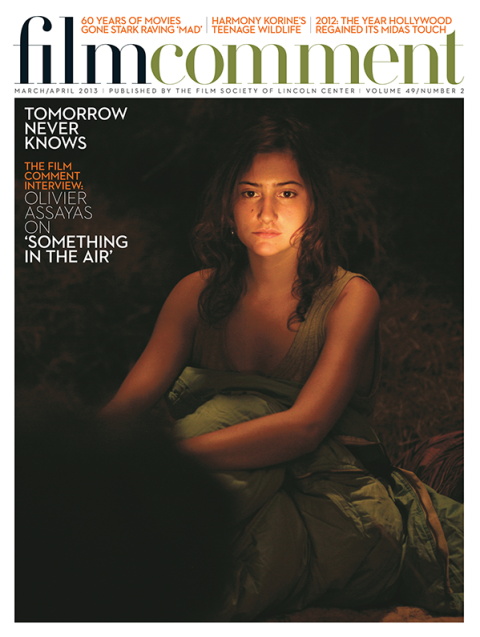
Twin Peaks crossed with The Killing—and that isn’t the half of it: the seven-episode television series Top of the Lake is the toughest, wildest picture Jane Campion has ever made. Campion’s previous foray into television, An Angel at My Table, a four-part biopic about the writer Janet Frame, was focused on a single character, and though dramatically and psychologically compelling, it lacked the expressive visual style of Campion’s features. With the emotional intensity of its performances and the urgency of its drama scaled to match its vast, primal setting and six-hour length, Top of the Lake is something else again: series television as epic poem, the Trojan Wars recast as the gender war. Three women, each on her own journey, connect and bring the patriarchy to its knees. But that’s too bald a description.
Like Twin Peaks, Top of the Lake begins with the body of a woman come to grief. Twelve-year-old Tui (Jacqueline Joe) isn’t dead, merely five months pregnant. we first see her standing up to her chest in an icy lake, completely motionless. does she want to drown herself, or perhaps induce a miscarriage? she’s rescued by a passerby and brought to the police. Robin Griffin (Elisabeth Moss), a detective who has returned to the bleak rural New Zealand town where she grew up in order to spend time with her dying mother, is recruited by Det. Sgt. Al Parker (David Wenham), who comprises nearly the entirety of the area’s law enforcement, to investigate what is at the least a case of statutory rape. Tui refuses to disclose who got her pregnant, although eventually she writes “no one” on a slip of paper. There is no lack of suspects. Tui’s father, Matt Mitcham (Peter Mullan, malign and absurdly attractive), runs a meth and ecstasy factory in his tumbledown fortress of a home and seems to have fathered nearly half a dozen children with various women, making incest as well as violence, past and present, Top of the Lake’s subtext of desire. he also seems to employ half the poverty-stricken town, providing a somewhat plausible explanation for why parker turns a blind eye to his activities. There are also Mitcham’s sullen, gun-toting sons, and a “foreign” teacher with a pedophile past. Tui disappears and Griffin steps up her investigation, determined to find her before the girl’s rapist kills her and the child she’s carrying, thus eliminating the DNA evidence of his paternity.

A stellar embodiment of “the law of the father,” Mitcham goes on the offensive when women challenge his rule. in addition to griffin’s “snooping,” he’s one-upped by GJ (holly hunter), who comes out of nowhere to buy the glorious lakefront property he presumes to be his by right. Rail thin, with gray hair to her waist, given to gnomic utterances and lengthy silences, GJ is guru to a community of women attempting to recover from lifetimes of abuse. Having installed her clan in shipping containers, she furthers the desecration by encouraging the anarchic behavior of her wild bunch, which consists largely of running around naked, showing off their post-menopausal bodies, and laughing loudly—damaged goods empowered by their own sense of comedy. Only Campion could have envisioned the scene in which Mitcham attempts to infiltrate the enemy camp by taking one of the crazy ladies on a date, dropping ecstasy with her and sharing an hour of overwhelming tenderness before things turn ugly.
Top of the Lake is a thrilling example of auteurist episodic television. Campion collaborated on the screenplay with Gerard Lee (the co-writer of her debut feature, Sweetie) and shared the directing duties with Garth Davis, a productive division of labor since he is very good at pushing the plot forward while she makes us aware of the abyss that lies beneath every action. The themes that underscore Campion’s films are all here, particularly the fear that bedevils female agency—of making bad, even deadly choices in matters of sex and love. Shooting with the Arri Alexa, cinematographer Adam Arkapaw turns a wilderness of water, deep forests, and jutting cliffs into a shaping force for narrative and character, while the editing scheme frequently juxtaposes huge landscapes with close-ups of Mullan, moss, and hunter’s faces—landscapes in their own right—the unblinking gaze of each fully alive, fired by thought, perception, and desire. The principal cast—which also includes Thomas M. Wright as Mitcham’s outcast son, whose renewed intimacy with Griffin brings her traumatic past to the fore and justifies her absolute need to rescue Tui—is superb. Despite a few too many plot turns and delays toward the end and a resolution that is a trifle too neat, Top of the Lake leaves one with a sense of uplift that’s close to sublime.








